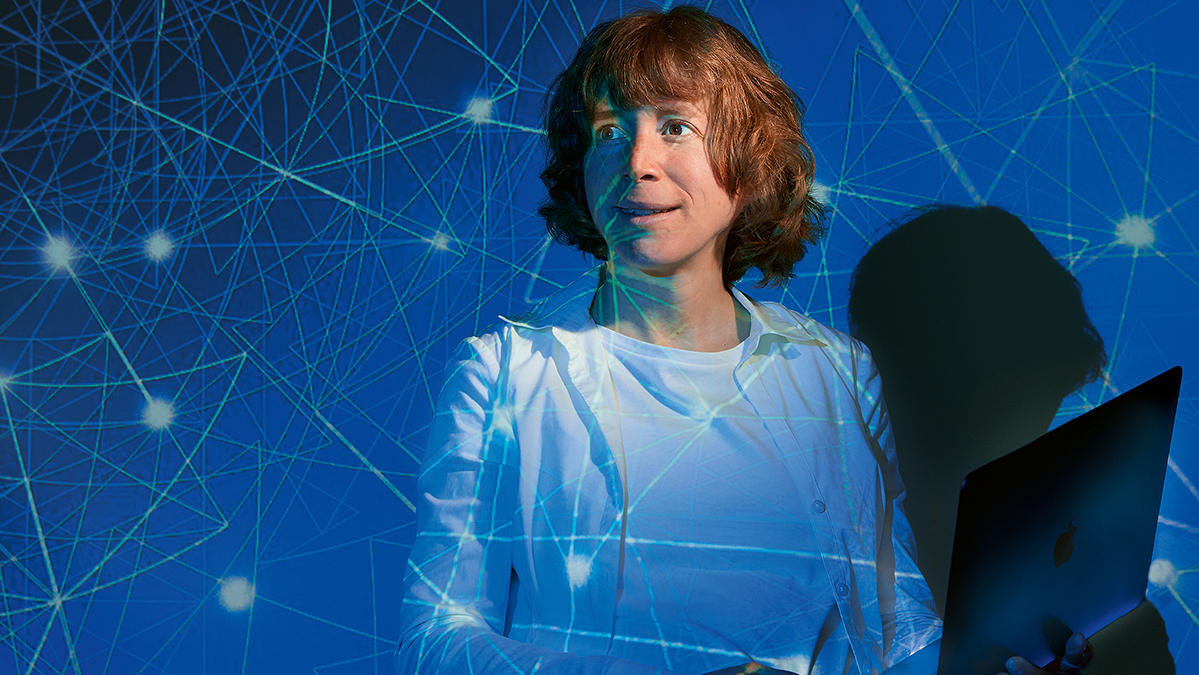An Ambassador for Open Science

Melanie Röthlisberger studied linguistics and wrote her PhD thesis on English language varieties. Her current, SNSF-funded project, My Child Speaks Balkan Slang, explores language variation in children’s Swiss-German dialects across urban and rural spaces. But this only takes up part of her time.
For her main job, the linguistics expert recently joined the Data Services & Open Access team of the Main Library of the University of Zurich. “Open access has been an important part of my research from the beginning,” Röthlisberger says. Thanks to her role at the Main Library, she can now pass on her expertise to others. Together with her team, she is getting ready to teach students and junior researchers at UZH the basics of open science in special courses as part of the Digital Skills for You program.
First-hand experience
As a linguist who programs analysis scripts and works with digitalized sets of texts, Melanie Röthlisberger has a penchant for data and statistics. And yet, her interest in open science matters didn’t evolve from her research, but was born of her personal experiences with access restrictions to scientific literature.
At KU Leuven, where she conducted research for her PhD thesis between 2014 and 2018, it was often the case that articles relevant to her research were unavailable. To gain access to these works, she thus had to draw on the more substantial resources of the University of Zurich. “This experience heightened my awareness of the importance of open access to academic work,” she says. Meanwhile, her thesis supervisor served as a role model, as he always made his manuscripts and data available online as early as possible.
According to Röthlisberger, there are many reasons to support open science and make research data, publications and programs publicly accessible. For one thing, research is funded by public money, which is why she thinks the public have a right to view the findings free of charge. For another, scientific progress depends on having results that are reproducible.
UZH Open Science Policy
Research can be verified more easily if the literature and data on which it is based is freely available. Some academic publishing practices are relatively complex and differ from one field to the next – for example, the peer review process. “Openly exchanging research data benefits researchers as well as society,” concludes the linguistics expert. This is true especially for members of less well-funded universities; with open science, they gain access to the full range of research results. This is why in 2020, research organizations such as the Swiss National Science Foundation (SNSF) and the European Research Council (ERC) started demanding that publications emerging from their projects be freely and openly accessible.
This is more or less also what the Plan S initiative by cOAlition S, an international consortium of research funding organizations, prescribes. As for UZH, its researchers are required to add their published work to the public repository ZORA, and to make their academic papers freely available as quickly as possible upon publication – either as an accepted manuscript or preferably as an article formatted by the publisher. The UZH Open Science Policy, which will be published later in the year, will include binding criteria on these matters.
Growing demands
One of the ways Melanie Röthlisberger supports these goals is through her role as open access ambassador at the SNSF. But she also sees the challenges faced by researchers. “The processes and requirements are fairly complicated in the details,” says the linguist. Especially junior researchers working flat out on their PhD thesis or as postdocs often reach their limits when it comes to meeting the requirements of open science publishing. They have to find the right journal, comply with detailed open access conditions or deal with possible article processing charges (APCs).
And publishing work in open access may also conflict with what’s best for their careers, if for example renowned journals don’t (yet) meet the required open access standards, or if APCs in hybrid journals (subscription journals that only publish articles in open access if APCs are paid) aren’t covered by those funding the research.
Emphasis on practical skills
This is where the recruitment conditions at universities, which are currently being adapted as part of the Declaration on Research Assessment (DORA), come in. “The world of scientific publishing is changing and going through a cultural shift, but recruitment practices are very slow to adapt while demands on researchers are increasing,” says Röthlisberger.
The courses taught by her and her team as part of the Digital Skills for You program aim to provide students and budding academics at UZH with the practical tools needed to navigate the open access landscape. The courses, which will be available through the School for Transdisciplinary Studies from the Fall Semester 2021, are expected to cover the basics of open science and, more importantly, to impart hands-on skills.